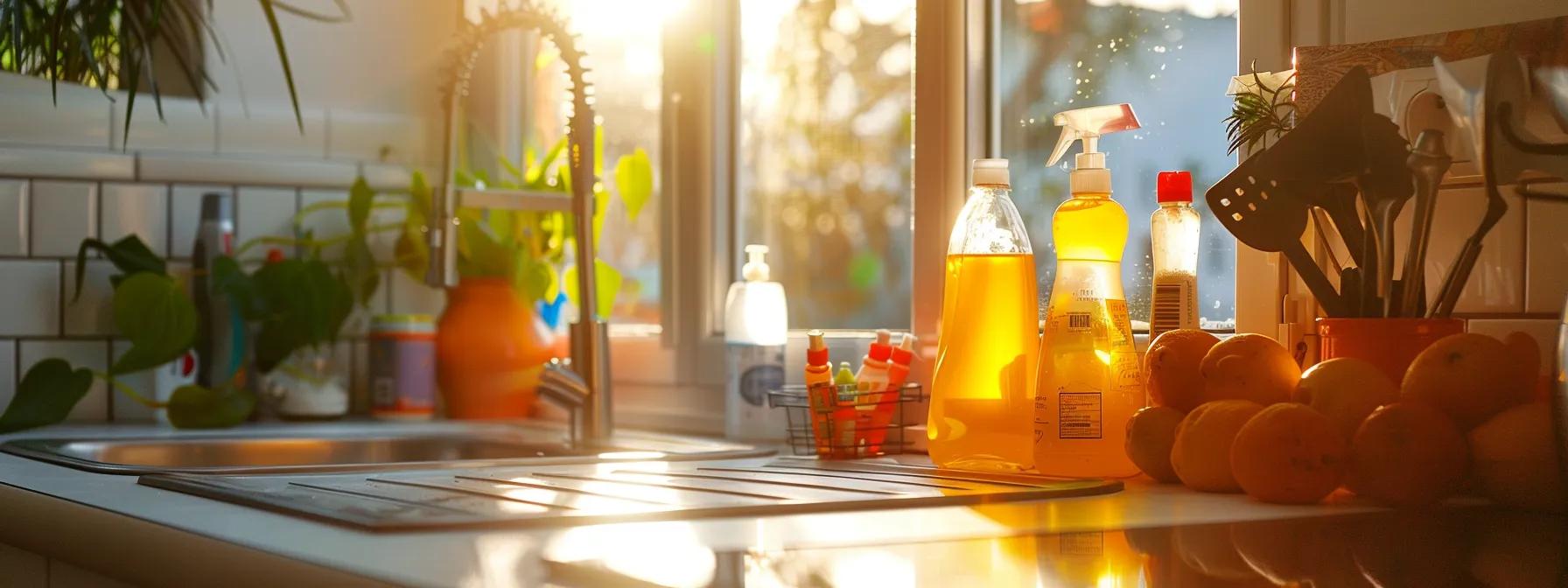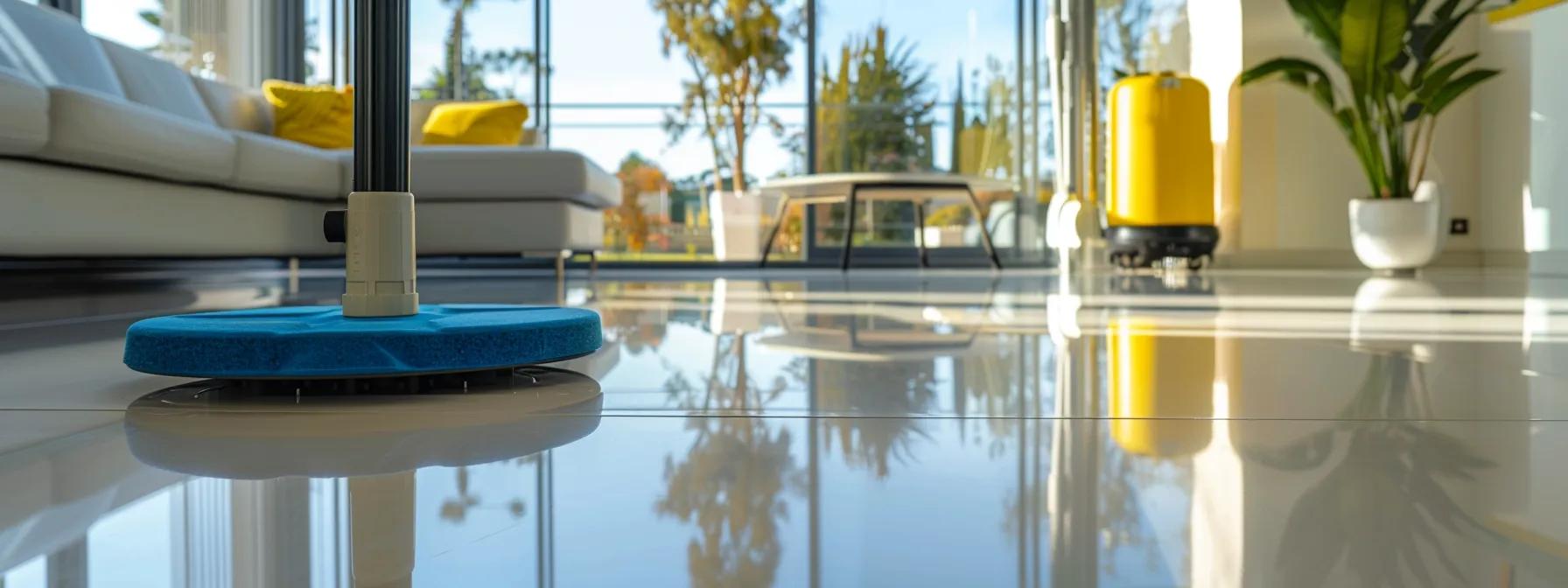Are your marble floors losing their shine due to stubborn stains and water damage? Maintaining natural stone tiles can be tricky, but with the right techniques, your floors can stay beautiful and durable. This article covers selecting the appropriate cleaning solutions, effective mopping methods, and essential prevention strategies. By following these practices, you can protect your natural stone tiles from everyday wear and tear, ensuring a pristine and long-lasting appearance.
Key Takeaways
- use pH-neutral cleaners to protect natural stone tile surfaces
- regularly seal grout lines to prevent stains and moisture penetration
- employ enzyme-based cleaners for organic stains on stone tiles
- promptly address spills to maintain stone tiles’ appearance and longevity
- select appropriate heavy-duty cleaners for deep restoration without damaging the stone
Natural Stone Tile Cleaner Effectiveness Guide
Understanding Natural Stone Tiles and Their Unique Care Needs
Natural stone tiles are a popular choice for both residential and commercial spaces due to their timeless beauty and durability. Common types of natural stone include limestone, granite, and marble, each offering unique textures and colors. These stone tiles add a touch of elegance and sophistication to any environment.
Maintaining natural stone tiles requires specific cleaning practices to preserve their appearance and structural integrity:
- Use pH-neutral cleaners to avoid damaging the stone surface.
- Protect grout lines by sealing them regularly to prevent stains.
- Avoid using vinegar or acidic substances, especially on delicate stones like limestone.
- Perform routine cleaning to remove dirt and debris that can scratch the surface.
Grout maintenance is essential when cleaning natural stone tiles, as grout can absorb moisture and stains over time. Keeping grout lines clean not only enhances the overall look of the tiled area but also prolongs the life of the stone tiles themselves.
Different types of natural stone, such as limestone, require tailored cleaning approaches to ensure their longevity. Using appropriate cleaning products and techniques helps maintain the stone’s natural beauty and prevents potential damage from improper cleaning methods.
Selecting the Right Cleaning Solutions for Natural Stone Tiles
Selecting suitable cleaning solutions is essential for natural stone tiles like travertine and concrete. This guide covers identifying pH-balanced cleaning agents for daily maintenance, using enzyme-based solutions for organic stains, and opting for heavy-duty cleaners for deep restoration. Avoiding acidic products helps protect tile surfaces and maintain their integrity.
Identifying pH-Balanced Cleaners for Daily Use
Using pH-balanced cleaners is essential for maintaining the pristine condition of natural stone tiles. These cleaners effectively remove dirt without compromising the stone’s surface, ensuring that tiles retain their natural luster. Employing a soft brush can help lift debris gently, preventing any potential scratches during the daily cleaning process.
Choosing non-abrasive, pH-balanced solutions also safeguards adjacent surfaces such as wood flooring and porcelain fixtures from damage. By selecting the right cleaning products, homeowners can maintain a cohesive and spotless appearance throughout their spaces, enhancing both durability and aesthetic appeal.
Using Enzyme-Based Cleaners for Organic Stains
Enzyme-based cleaners effectively target organic stains on natural stone tiles such as granite and slate. These cleaners are safe to use in bathrooms, ensuring that porcelain tile and ceramic surfaces remain spotless without causing damage.
To maximize their effectiveness, enzyme-based cleaners should be used as follows:
- Spray the cleaner directly onto the stain.
- Let it dwell for the recommended time to break down the stain.
- Gently scrub with a non-abrasive brush to lift the residue.
- Rinse thoroughly with clean water to remove any leftover cleaner.
Choosing Heavy-Duty Cleaners for Deep Restoration
For deep restoration of natural stone tiles, selecting the appropriate heavy-duty cleaners is crucial to effectively remove embedded soil and stubborn stains without compromising the stone’s integrity:
| Cleaner Type | Suitable For | Advantages | Considerations |
|---|---|---|---|
| Alkaline Cleaners | Granitic and slate tiles | Excellent for breaking down organic soil and grease | Avoid on delicate stones like marble |
| Bleach-Free Oxygen Cleaners | All natural stone surfaces | Effective against mold and mildew without discoloration | May require longer dwell time for tough stains |
| Steam Cleaners | Indoor and outdoor pavers | Deep cleans dust and grime without chemicals | Ensure temperature settings are stone-appropriate |
Implementing these heavy-duty cleaning solutions ensures that pavers and other natural stone surfaces remain free from persistent dust and soil accumulation, promoting a long-lasting and visually appealing environment.
Effective Methods for Cleaning Natural Stone Tiles
Effectively cleaning natural stone tiles involves several key techniques to maintain their beauty and longevity. Spot cleaning spills promptly with a pH-balanced cleaner protects the porous surface. Routine vacuuming and sweeping prevent debris buildup, while proper mopping procedures, combined with an appropriate sealant, ensure terrazzo and other stone types remain undamaged.
Techniques for Spot Cleaning Spills
When dealing with spills in areas like the shower or kitchen, it’s crucial to act swiftly to prevent stains on natural stone tiles such as sandstone. Using a high-quality microfiber cloth, professionals gently blot the affected area, ensuring that liquids are absorbed without scratching the stone surface:
| Spill Type | Recommended Technique | Tools Needed |
|---|---|---|
| Water-Based Spills | Immediate blotting to prevent water spots | Microfiber cloth |
| Oil-Based Spills | Apply steam to break down oils before wiping | Steam cleaner, microfiber cloth |
| Solid Debris | Use a vacuum cleaner to remove particles before cleaning | Vacuum cleaner, soft brush attachment |
Regular maintenance and prompt attention to spills not only preserve the aesthetic appeal of sandstone tiles but also extend their lifespan. Incorporating tools like steam cleaners can effectively handle stubborn stains, ensuring that natural stone surfaces remain pristine and hygienic.
Best Practices for Routine Vacuuming and Sweeping
Using a vacuum cleaner equipped with a soft brush attachment is essential for removing dust, adhesive particles, and other debris from natural stone tiles. Regular vacuuming helps prevent the accumulation of efflorescence, ensuring that the stone maintains its natural beauty and integrity. This practice also minimizes the risk of scratches and preserves the longevity of the tiled surface.
When sweeping natural stone tiles, it is important to promptly address any liquid spills to avoid stains and mold growth. Incorporating disinfectant treatments during routine cleaning can enhance hygiene and protect grout lines from moisture-related issues. Additionally, homeowners can receive maintenance reminders and tips via email, ensuring consistent care and preventing potential damage to their stone tiles.
Mopping Procedures to Prevent Damage
When mopping natural stone tiles, it is essential to use a mild, pH-neutral detergent to prevent any chemical damage to the surface. Avoid using acidic substances such as lemon-based cleaners, which can etch the stone and compromise its integrity. Additionally, ensure that the mop is damp rather than soaking wet to protect surrounding materials like wood flooring and cement substrates from moisture-related issues.
Employing proper mopping techniques helps maintain the pristine appearance of stone tiles while safeguarding nearby countertops and fixtures. Regularly rinsing the mop with clean water after each pass removes any residual detergent, minimizing the risk of buildup and streaks. By adhering to these practices, homeowners can preserve the beauty and longevity of their natural stone surfaces effectively.
The Importance of Resealing Natural Stone Tiles
Resealing natural stone tiles is essential for preserving their beauty and ensuring effective floor cleaning. Determining when to reseal involves assessing surface wear and resistance to stains from substances like grease, juice, and ammonia. Regular sealing enhances tile longevity and provides a protective barrier, ensuring that maintenance practices remain efficient and surfaces stay vibrant.
Determining When to Reseal
Determining when to reseal natural stone tiles involves monitoring signs such as the presence of mold and soap scum, especially in high-moisture areas like kitchens. Regular exposure to oil and spills can penetrate the stone, indicating that a reseal is necessary to protect the surface from further damage.
| Indicator | Description | Action Required |
|---|---|---|
| Discoloration | Visible changes in tile color due to stains or wear | Reseal the affected area to restore protection |
| Water Absorption | Tiles absorb water quickly, leading to potential mold growth | Apply a new sealant to prevent moisture penetration |
| Surface Roughness | Tiles feel rough or uneven to the touch | Reseal to smooth the surface and enhance durability |
Additionally, the type of stone and its quarry origin play a role in determining the resealing schedule. For instance, marble from specific quarries may require more frequent sealing compared to granite, ensuring that each stone type maintains its natural beauty and resistance to common kitchen contaminants.
Benefits of Regular Sealing for Longevity
Regular sealing provides essential waterproofing for natural stone tiles, safeguarding their mineral composition against moisture and spills. In Australia’s diverse climates, this protection is crucial to maintain the stone’s integrity and appearance over time. By creating a barrier, sealing prevents liquids from penetrating the surface, thereby reducing the risk of stains from common household items like bottles and spills.
Additionally, consistent sealing enhances the durability of natural stone tiles by protecting them from everyday wear and tear, including potential damage from steel-based cleaning tools. This proactive maintenance not only preserves the elegant look of the tiles but also minimizes the need for frequent deep cleaning. For homeowners in Australia, investing in regular sealing ensures long-lasting beauty and functionality of their natural stone surfaces.
How to Properly Reseal Natural Stone Tiles
To properly reseal natural stone tiles, begin by thoroughly cleaning the surface using a vacuum to remove any loose dirt and debris. Next, apply an environmentally friendly sealant evenly with a sponge, ensuring complete coverage of each tile and grout line:
- Vacuum the entire area to eliminate dirt and dust.
- Use a sponge to apply the sealant in a consistent manner.
- Allow the sealant to dry completely, following the manufacturer’s instructions.
- Avoid contact with hardwood surfaces during the sealing process to prevent damage.
Once the sealant has dried, maintain the tiles by regularly using a soft sponge for gentle cleaning and promptly addressing any rust stains to preserve the stone’s appearance. Selecting environmentally friendly cleaning products ensures that the natural stone remains protected without harming surrounding surfaces.
Understanding Grout Cleaners and Sealers for Natural Stone Floors
Selecting appropriate grout cleaners and choosing the right stone sealer are essential for maintaining natural stone floors. Properly applying a protective coating helps prevent haze and stains. Additionally, DIY grout cleaning solutions provide effective, cost-efficient options for homeowners seeking reliable cleaning methods.
Selecting Appropriate Grout Cleaners
When selecting grout cleaners, it’s important to consider the specific needs of your natural stone floors. Effective products should efficiently remove dirt and stains without harming the grout or the stone itself. Utilizing tools like a broom for initial cleaning and incorporating devices such as Kärcher pressure washers can enhance the effectiveness of these cleaners:
| Cleaner Type | Best For | Benefits |
|---|---|---|
| Enzyme-Based Cleaners | Organic stains from spills and pets | Safe for carpets and glass surfaces, eco-friendly |
| pH-Neutral Cleaners | Daily maintenance and light cleaning | Preserves wax finishes, gentle on grout |
| Heavy-Duty Cleaners | Deep cleaning and stubborn stains | Effective with high-pressure equipment like Kärcher |
Implementing the appropriate grout cleaner ensures that the natural stone floors remain vibrant and durable, while also being compatible with other cleaning products and tools such as carpets and glass fixtures.
Choosing Sealers for Maximum Protection
Choosing the right sealer for bluestone ensures maximum protection against common stains like coffee and wine. A high-quality sealer penetrates the stone, creating a barrier that resists absorption and makes it easier to clean up spills promptly. This protective layer is essential for maintaining the natural beauty of bluestone, especially in high-traffic areas prone to debris accumulation.
Additionally, selecting a durable sealer helps safeguard natural stone floors from harsh cleaning agents, such as dishwashing liquid, which can degrade the surface over time. By investing in the appropriate sealer, homeowners can prevent stains and maintain the integrity of their stone tiles, ensuring a long-lasting and pristine appearance.
DIY Grout Cleaning Solutions
Residents of Brisbane can effectively manage grout cleanliness on their terracotta floors by using simple DIY solutions. Mixing baking soda with water creates a gentle paste that removes sand and dirt without harming the stone. This method is particularly useful in areas with high humidity, where mildew can easily develop.
Another practical approach involves using white vinegar and hydrogen peroxide to tackle stubborn mildew stains. By applying this mixture to the grout lines, homeowners can maintain a fresh and hygienic environment. These DIY grout cleaning solutions not only preserve the beauty of terracotta tiles but also ensure long-lasting protection against common issues like sand buildup and mildew growth.
Proactive Prevention Strategies for Maintaining Natural Stone Tiles
Proactive prevention strategies include regular maintenance routines with appropriate cleansers and tools like squeegees, avoiding metal abrasives and harsh chemicals typically found in laundry products. Additionally, establishing an effective spill response plan protects mosaic tiles, ensuring the longevity and pristine appearance of natural stone surfaces.
Implementing Regular Maintenance Routines
Implementing regular maintenance routines for natural stone tiles begins with online scheduling of cleaning sessions to ensure consistency. Using the right tools, such as non-abrasive cloths and soft brushes, helps avoid scratches while effectively removing dirt and grime. Addressing dishwashing spills promptly with hydrogen peroxide prevents stains from setting, maintaining the tile’s original beauty.
Additionally, incorporating gentle sanding with fine sandpaper can restore the tile’s surface without causing damage, addressing minor imperfections before they escalate. By adhering to these maintenance practices, homeowners can preserve the longevity and appearance of their natural stone tiles, ensuring a clean and inviting environment for years to come.
Avoiding Harsh Chemicals and Abrasives
Avoiding harsh chemicals and abrasives is crucial for the longevity of natural stone tiles. Instead of using epoxy-based cleaners or abrasive powders, professionals recommend gentle poultice methods to remove stubborn stains without harming the stone surface. This careful approach ensures that the tiles retain their natural beauty and structural integrity over time.
Applying paint or sealants should be approached with caution, as improper use can compromise the appearance of natural stone. Utilizing non-abrasive tools and selecting pH-neutral products enhances the longevity of the flooring by preventing scratches and chemical damage. By following these best practices, homeowners can maintain the pristine condition of their natural stone tiles effectively.
Creating an Effective Spill Response Plan
Establishing a spill response plan is essential for protecting natural stone tiles from moisture damage. Strategically placing absorbent mats in high-traffic areas can effectively contain liquids, minimizing the risk of stains and preserving the stone’s integrity.
When spills occur, using appropriate cleaning agents such as hydrogen peroxide can swiftly address organic stains, restoring the surface without escalating costs. Drawing inspiration from resources like Pinterest, homeowners can implement practical solutions that balance effectiveness with price considerations.
Frequently Asked Questions
What Are the Specific Care Requirements for Natural Stone Tiles?
Proper care for natural stone tiles begins with regular cleaning using pH-neutral cleaners to maintain their appearance and integrity. It is important to immediately wipe up spills to prevent staining and avoid using abrasive tools that can scratch the surface.
Additionally, sealing natural stone tiles is crucial to protect them from moisture and stains. Experts recommend resealing every one to three years, depending on the stone type and foot traffic, to ensure long-lasting beauty and durability.
How do you choose appropriate cleaning solutions for natural stone tiles?
Choosing the right cleaning solutions for natural stone tiles begins with understanding the specific type of stone you have. Opt for pH-neutral cleaners to preserve the tile’s surface and prevent any chemical damage. Avoid acidic or abrasive products that can cause staining or erosion.
Select environmentally friendly options that are safe for both your tiles and the surrounding environment. It is essential to test any new cleaner on a small, hidden area first. Consulting with professional cleaning services ensures that your natural stone tiles remain beautiful and well-maintained.
What methods effectively clean natural stone tiles?
Alliance Cleaning Services employs specialized techniques to effectively clean natural stone tiles. They use pH-neutral cleaners that protect the stone’s integrity, ensuring stains and grime are removed without causing damage. Regular maintenance preserves the tile’s appearance and longevity.
Their expert team also focuses on grout cleaning, utilizing advanced equipment to eliminate deep-seated dirt and mildew. Additionally, Alliance applies high-quality sealants to safeguard the surfaces, maintaining a pristine and hygienic environment in both residential and commercial spaces.
Why Is Resealing Natural Stone Tiles Important?
Resealing natural stone tiles is essential to protect them from stains and moisture infiltration. This process extends the lifespan of the tiles, ensuring they remain attractive and functional in both residential and commercial spaces.
By resealing, Alliance Cleaning Services helps preserve the natural beauty and integrity of stone surfaces. Regular maintenance reduces the risk of damage and simplifies cleaning, making it easier to maintain a hygienic and appealing environment.
What is the role of grout cleaners and sealers in stone floor maintenance?
Grout cleaners remove dirt, mold, and stains from the gaps between stone tiles, maintaining the floor’s appearance and hygiene. Regular cleaning prevents buildup that can damage the stone and extends the floor’s lifespan.
Sealants protect grout from moisture and spills, reducing the risk of staining and deterioration. By applying sealers, surfaces remain easier to clean and resist daily wear, ensuring stone floors stay beautiful and durable over time.
Conclusion
Maintaining natural stone tiles preserves their elegant appearance and ensures their long-lasting durability. Using appropriate cleaning solutions, such as pH-neutral and enzyme-based cleaners, protects the stone surfaces from damage and stains. Regular grout sealing and proactive prevention strategies further enhance the integrity and beauty of both tiles and grout lines. By adopting these effective cleaning practices, homeowners can enjoy pristine and resilient stone surfaces for many years.




